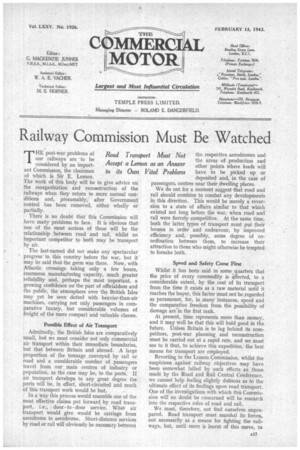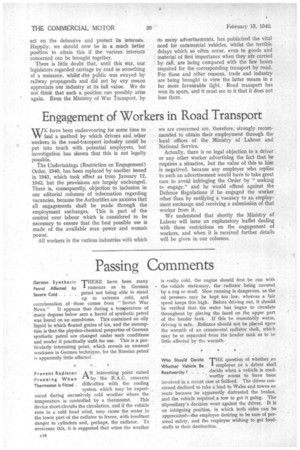R ailway Commission Must Be Watched
Page 19

Page 20

If you've noticed an error in this article please click here to report it so we can fix it.
THE post-war problems of our railways are to be considered by an important Commission, the chairman of which is Sir E. Lemon. The work of this body will be to give advice on the reorganization and reconstruction of the railways when they return to more normal conditions and, presumably, after Government control has been removed, either wholly or partially.
There is no doubt that this Commission will have many problems to face. It is obvious that one of the most serious of these will be the relationship between road and rail, whilst an important competitor to both may be transport by air.
The last-named did not make any spectacular progress in this country before the war, but it may be said that the germ was there. Now, with Atlantic crossings taking only a few hours, enormous manufacturing capacity, much greater reliability and, perhaps the most important, a growing confidence on the part of officialdom and the public, the atmosphere over the British Isles may yet be seen dotted with heavier-than-air machines, carrying not only passengers in comparative luxury, but considerable volumes of freight of the more compact and valuable classes.
Possible Effect of Air Transport Admittedly, the British Isles are comparatively small, but we must consider not only commercial air transport within their immediate boundaries, but that between Britain and abroad. A large proportion of the tonnage conveyed by rail or road and a considerable number of passengers travel from our . main centres of industry or population, as the case may be, to the ports. If air transport develops to any great degree the ports will be, in effect, short-circuited and much of this transport work would be lost.
In a way this process would resemble one of the most effective claims put forward by road transport, i.e., doorto door service. What air transport would give would be carriage from aerodrome to aerodrome. Short-distance services by road or rail will obviously be necessary between the respective aerodromes and the areas of production and other points where loads will have to be picked up or deposited and, in the case of passengers, centres near their dwelling places.
We do not for a moment suggest that road and rail should combine to combat any developments in this direction. This would be merely a reversion to a state of affairs similar to that which existed not long before the war, when road and rail were fiercely competitive. At the same time, both the latter types of transport must put their houses in order and endeavour, by improved efficiency and, possibly, some degree of coordination between them, to increase their attraction to those who might otherwise be tempted to forsake both.
Speed and Safety Come First Whilst it has been said in some quarters that the price of every commodity is Affected, to a considerable extent, by the cost of its transport from the time it exists as a raw material until it reaches the buyer, this factor must not be regarded as paramount, for, in many instances, speed and the comparative freedom from the possibility of damage are-in the first rank.
At present, time represents more than money, and it may well be that this will hold good in the future. Unless Britain is to lag behind its competitors, post-war planning and reconstruction must be carried out at a rapid rate, and we must see to it that, to achieve this expeditiOn, the best means for transport are employed.
Reverting to the Lemon Commission, whilst the suspicions against railway objectives may have been somewhat lulled by such efforts as those made by the Road and Rail Central Conference, we cannot help feeling slightly dubious as to the ultimate effect of its findings upon road transport. One of the investigations with which this Commission will no doubt be concerned will be research into the respective roles of road and rail.
We must, therefore, not find ourselves unprepared. Road transport must marshal its forces, not necessarily aS a means for fighting the railways, but, until more is learnt of this move, to act on the defensive and protect its interests. Happily, we should now be in a much better position to attain this if the various interests concerned can be brought together.
There is little doubt that, until this war, our legislators regarded carriage by road as something of a nuisance, whilst 'the public was swayed by railway propaganda and did not by any means appreciate our industry at its full value. We do not think that such a position can possibly arise again. Even the Ministry of War Transport, by its many advertisements, has publicized the vital need for commercial vehicles, whilst the terrible delays which so often occur, even to goods and material of first importance when they ale carried by rail, are being compared with the few hours required for the corresponding transport by road. -For these and other reasons, trade and industry are being brought to view the latter means in a far more favourable light. Road transport has won its spurs, and it must see to it that it does not lose them.




















































